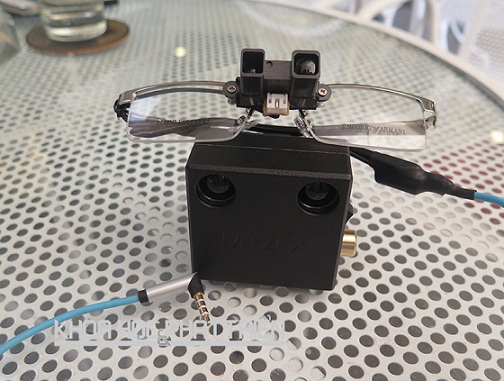A group of students – Nguyen Phi Lan, Tran Nguyen Phuc and Le Ngoc Hoang from the Dong Nai University - have invented a robot.
The robots can become wheelchair to move, or turn into a bed. In addition, it can be lifted and lowered, which helps users move from the robot to his bed without assistance.
The robot won first prize at the second Vietnamese Creators with Intel Galileo Contest, in 2016.
The glasses were created by Nguyen Ba Hai and his co-workers from the HCMC University of Technical Education. They help visually impaired people discover obstacles from a distance of up to 3.5 meters.
The product is called ‘magic eyes for the visually impaired’.
The new version of the ‘magic eyes’, named MT2EX, introduced in August 2016, can detect obstacles from head to toe thanks to the combination of sensor attached on the glasses and the device on the user’s belt.
When discovering obstacles, the device will ring to give an alert. The battery has been improved to have longer life: it can be used for 7 hours.
The inventor is working on the third version which will have more improvements, and plans to create 100 glasses under a contract worth VND5.5 billion ordered by the Ministry of Science & Technology.
Smart electronic gloves
Created by Le Ngo Duy Phong, a student from the HCMC University of Natural Sciences, the gloves have many useful integrative functions.
The left glove serves as a mobile phone with a braille typewriting key system on the knuckles, speaker in middle finger and microphone under palm.
If the user wants to talk, they put their hand on the cheek, while the keys are operated based by touch and finger movement. The right glove has its own key system and connects to computers via wireless wave.
MutiGlass glasses for handicapped
Le Anh Tien, Le Hoang Anh and Hoang Minh Phu from Da Nang City used RF wireless data transmission technology, which allows the user to control the mouse pointer by tilting its head in all directions. If the users want to use the keyboard, they can click through the virtual keyboard.
In order to use glasses, it is necessary to connect it with a computer through a USB gate.
Smart wheelchairs
A group of students from the Hung Yen University of Technique Education has created a multi-functional wheelchair by connecting a smartphone and wheelchair.
User can control the wheelchairs from avdistance via smartphone, voice or head movements.


